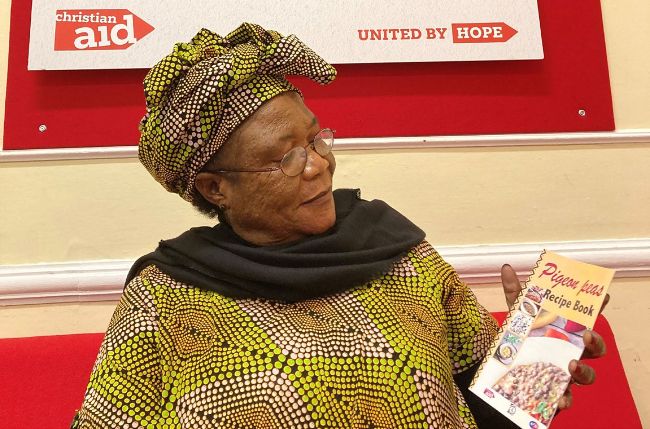Christian Aid believed in our dream
Thomas Baldwin looks ahead to Christian Aid Week which takes place this month.

Thomas Baldwin
THIS Christian Aid week, Susan Chimbayo has a message for supporters: thank you, but we hope not to need your help in future.
Susan is the founder and chair of Nandolo Farmers Association (NFA), a co-operative supported by the aid agency, which is improving the lives of thousands of smallscale Malawian pigeon pea farmers.
The pigeon pea (also known as the yellow split pea) is a phenomenally useful crop for a poor farmer: it doesn’t require fertiliser, and every part of the plant is good for something, whether that’s human or animal consumption, firewood or being returned to the soil as nitrogen-rich ‘green manure’.
This means that farmers can grow it as a cash crop as well as to feed themselves, which is often all they can manage with the more traditional staple crops such as maize. It is also resistant to both flood and drought - essential in a time of increasing climate uncertainty.
“There have been so many success stories (with pigeon peas) in Malawi,” says Susan, citing a lady with five children who had been abandoned by her husband. “She had nothing. She couldn’t send the children to school. Since we introduced pigeon peas to them, as a crop that can bring in cash, their lives have changed. She’s managed to build her own house, her children are able to go to school, she can feed them properly, she can even afford to take them to hospital if they get sick.
“The pigeon pea crop is a crop that has changed the lives of many, many people, from poverty to prosperity. For example, if you are not selling it you will be able to produce animal feed. You will be able to have chickens, pigs, goats, cows and you feed them with your pigeon peas and you will be able to sell the animals at a very high price.
“We’ve had flooding in Malawi, and we’ve had times of no rains coming at all. But this crop will stand all that. It will grow anyway. And even if flooding comes and it flattens the place, it will bounce back, unlike the ground nuts or beans or maize which will all be washed away.“
However, there are still many challenges for the individual farmer. Ninety per cent of the market for pigeon peas is in export, chiefly to India, and the farmers are at the mercy of the commodity markets. Living a hand-to-mouth existence, and with nowhere to store their crop even if they could afford to wait, many smallholders are forced to sell their produce at a low price. The buyer will then make a large profit selling it on.
“In Malawi we use the horse to plough, which makes production very low, unlike in other countries where you have machines,” say Susan. “We have to do everything by hand, and it’s hot under that scorching sun. And then you don’t even get the profit of what you’ve sweated for.”
This is where the NFA (‘nandolo’ is a local word for pigeon peas), established in 2015 with Christian Aid’s help, comes in. A co-operative of over 10,000 farmers (and rising), the association ensures that producers get a good price for their crop, paying for it at market rates when the peas are delivered but also passing on future profits. They have built warehouses so they can store the product in bulk, and are also investing in the machines to turn peas into dhall, infant food, and animal feed pellets.

Susan Chimbayo with the pigeon peas recipe book
“
This is something which can work. Christian Aid believed in our dream, and we have seen what has happened to the lives of many, many Malawians who want to get away from being ‘given’.
They are also trying to raise the popularity of pigeon peas as a foodstuff locally, and have published a book of recipes for everything from dhall and porridge to biscuits and cakes made with the pigeon peas.
“A lot of people didn’t know how good pigeon peas can be,” says Susan. “It’s highly nutritious, you can grow it as a business you can make so many things with it. We wrote that recipe book, we’ve tried it, it has worked. We’ve also built bakeries for our farmers, just to make sure they are able to do what we’ve said in the recipe book.”
The long-term aim, she says, is to get away from dependence on aid – permanently. “This is something which can work. Christian Aid believed in our dream, and we have seen what has happened to the lives of many, many Malawians who want to get away from being ‘given’.
“Teach somebody to fish, don’t give them a fish, because one day you will not be there and then where will we get the fish from? All we are crying for is to be empowered, so that we are able to sustain ourselves. The market is there, the opportunities are there, and they are massive.” ¤
Following this interview, shortly before Life and Work went to press, Cyclone Freddy brought widespread damage and flooding to Malawi. Susan writes: “This year we worked tirelessly to have bumper yields as we were told that we could export nandolo as we had… but alas, many of our fields have been washed away thereby taking away the hopes that we had for the year. Many farmers will indeed struggle this year as they have lost the crop that had the potential to change their lives. I should also point out that apart from nandolo other crops like maize and soya bean have also been washed away hence the future doesn’t look promising for many farmers here.”
This Christian Aid Week (May 14-20) supporters are invited to take part in the ‘Big Pea Challenge’ and hold a pea-themed fundraising event.
Ideas include hosting a pea soup lunch or a pea-themed dinner party, the ‘peas be with you’ challenge to eat peas in every meal for a week, or a cooking demonstration. You could also grow and sell your own plants or hold a plant growing or flower arranging competition.
There are also a range of themed family games, and a Christian Aid Week quiz, as well as the traditional Christian Aid Week envelope collection.
For more information on the Big Pea Challenge, church resources including seven days of prayers and reflections, and to order everything you need for an envelope collection or quiz night, visit www.christianaid.org. uk/appeals/key-appeals/christianaid-week